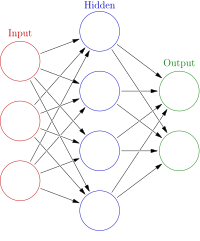
Photo from wikipedia
American Society of Hematology's Clinical Research Training Institute (CRTI) is a clinical research training program with a competitive application process. Objectives were to compare application scores by applicant and reviewer… Click to show full abstract
American Society of Hematology's Clinical Research Training Institute (CRTI) is a clinical research training program with a competitive application process. Objectives were to compare application scores by applicant and reviewer gender and underrepresented minority (URM) status. We included applications to CRTI from 2003-2019. Application scores were transformed to a 0-100 scale (100 was strongest). Factors considered were applicant and reviewer gender and URM status. We evaluated whether there was an interaction between characteristic and time related to application scores. If the interaction was significant, we stratified analysis by three time periods. There were 713 applicants and 2,106 reviews included. There was no significant difference in scores by applicant gender. URM applicants had significantly worse scores compared to non-URM applicants (mean (standard error) 67.9 (1.56) vs. 71.4 (0.63); P=0.0355). There were significant interactions between reviewer gender and time (P=0.0030) and reviewer URM status and time (P=0.0424); thus, results were stratified by time. For the earlier two time periods, male reviewers gave significantly worse scores compared to female reviewers; this difference did not persist for the most recent time period. URM reviewers did not give significantly different scores for any of the three time periods. URM applicants received significantly lower scores compared to non-URM applicants. Impact of reviewer gender and URM status changed over time. While male reviewers gave lower scores in the early periods, this effect did not persist in the latest period. Efforts to mitigate the impact of applicant URM status on application scores are required.
Journal Title: Blood advances
Year Published: 2023
Link to full text (if available)
Share on Social Media: Sign Up to like & get
recommendations!